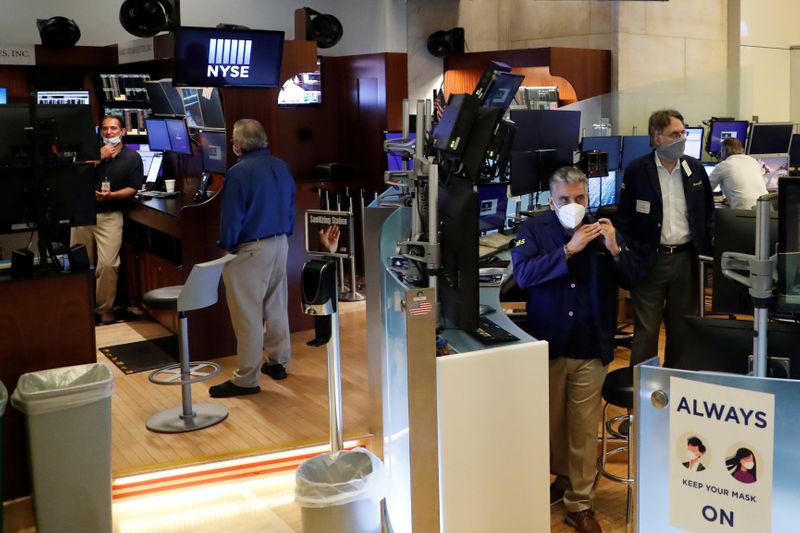NEW YORK (Reuters) – The dollar slid to a three-month low and a gauge of global stocks fell on Wednesday after the Federal Reserve projected a more sluggish recovery than the market expected, but the Nasdaq hit a fresh high on expectations of low interest rates past 2022.
The greenback fell to three-month troughs against the euro, sterling and Swiss franc after the end of a two-day meeting of the Fed’s policy-setting committee, in which it repeated its promise of continued extraordinary support for the economy.
Policymakers projected a 6.5% decline in gross domestic product this year and a 9.3% unemployment rate at year’s end. The key overnight interest rate, or federal funds rate, would remain near zero through at least 2022, a Fed statement said.
“What they’re looking at is a rebound that is going to take at least until 2022. That fits maybe a little worse-than-expected consensus,” said Marvin Loh, senior global macro strategist at State Street Global Markets in Boston.
MSCI’s gauge of stocks across the globe shed 0.27% while the Dow industrials and benchmark S&P 500 closed lower. But the Nasdaq rose as low interest rates are good for growth-oriented companies that may take longer to turn profitable, such as Amazon.com as it grew, Loh said.
“They’re longer duration-type companies that benefit from a good growth profile. Their earnings are further out,” he said.
After last week’s surprisingly upbeat jobs report, with the economy adding 2.5 million jobs in May as opposed to forecasts of payrolls falling by 8 million, some investors had hoped for a rosier outlook.
Low rates, however, will hurt banks and their loan portfolios. An S&P subsector of banking shares fell 5.8% in its biggest daily percentage decline since April 15, while the S&P 500 financial sector was the biggest drag on the overall index.
The Dow Jones Industrial Average fell 282.31 points, or 1.04%, to 26,989.99. The S&P 500 lost 17.04 points, or 0.53%, to 3,190.14 and the Nasdaq Composite added 66.59 points, or 0.67%, to 10,020.35.
U.S. Treasury yields fell as the Fed promised to maintain bond purchases at “the current pace” of about $80 billion per month in Treasuries and $40 billion per month in agency and mortgage-backed securities.
Benchmark 10-year Treasury yields fell 9 basis points to 0.744%. Two-year yields, which are the most sensitive to rate changes, fell 3 basis points to 0.177%.
The dollar fell about 0.4% against a basket of major currencies to 95.882, after earlier sliding to 95.714, a level not seen since mid-March.
The euro rose as high as $1.1422 and sterling reached $1.2812, with the dollar hitting a three-month low of 0.9425 franc versus the Swiss currency.
Oil rebounded from earlier losses, even as U.S. data showed crude inventories rose to a record high, reviving worries of a persistent glut due to weak demand.
Crude stocks rose by 5.7 million barrels in the week to June 5 to 538.1 million barrels, according to a U.S. Energy Information Administration report. [EIA/S]
Brent crude settled up 55 cents to $41.73 a barrel. U.S. West Texas Intermediate (WTI) rose 66 cents to $39.60 after falling more than 2% in the session.
Demand remains subdued as seen in U.S. consumer prices, which fell for a third straight month in May, with underlying inflation weak. The consumer price index dipped 0.1% last month after plunging 0.8% in April, the largest decline since December 2008.
But copper prices rose for a fifth straight session to their highest since January as the metal, which is widely used in the construction and power industries, has been supported by firm demand and an improved technical picture.
Benchmark copper on the London Metal Exchange (LME) was up 0.8% at $5,822 per tonne in official trading.
MSCI’s broadest index of Asia-Pacific shares outside Japan advanced 0.66% for its 10th straight session of gains.
(Reporting by Dhara Ranasinghe; Additional reporting by Tom Westbrook in Singapore; Editing by Toby Chopra and Jonathan Oatis)

























